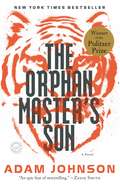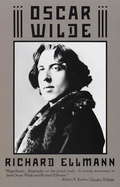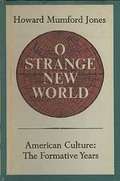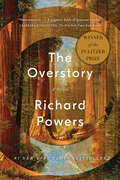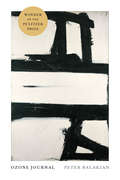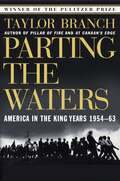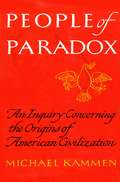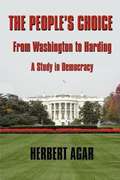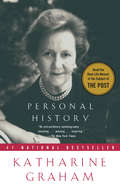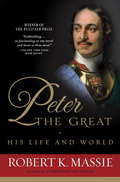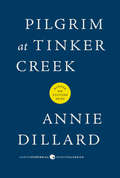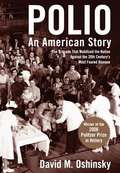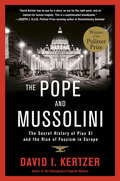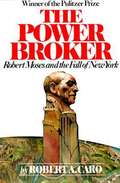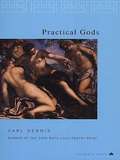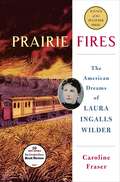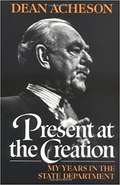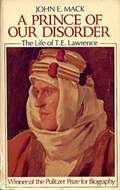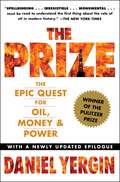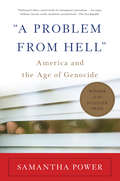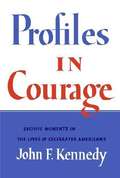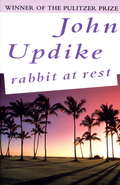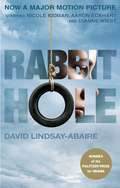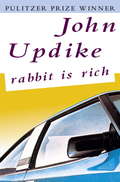Special Collections
Pulitzer Prize Award Winners
Description: Bookshare is pleased to offer the following titles, winners of the Pulitzer Prize Award. Note: Some drama winners are available and are listed under Fiction awards. #award
- Table View
- List View
The Orphan Master's Son
by Adam JohnsonPak Jun Do is the haunted son of a lost mother—a singer “stolen” to Pyongyang—and an influential father who runs a work camp for orphans. Superiors in the North Korean state soon recognize the boy’s loyalty and keen instincts. Considering himself “a humble citizen of the greatest nation in the world,” Jun Do rises in the ranks. He becomes a professional kidnapper who must navigate the shifting rules, arbitrary violence, and baffling demands of his overlords in order to stay alive. Driven to the absolute limit of what any human being could endure, he boldly takes on the treacherous role of rival to Kim Jong Il in an attempt to save the woman he loves, Sun Moon, a legendary actress “so pure, she didn’t know what starving people looked like.”
Part breathless thriller, part story of innocence lost, part story of romantic love, The Orphan Master’s Son is also a riveting portrait of a world heretofore hidden from view: a North Korea rife with hunger, corruption, and casual cruelty but also camaraderie, stolen moments of beauty, and love.
Oscar Wilde
by Richard EllmannThe biography sensitive to the tragic pattern of the story of a great subject: Oscar Wilde - psychologically and sexually complicated, enormously quotable, central to a alluring cultural world and someone whose life assumed an unbearably dramatic shape.
O Strange New World
by Howard Mumford JonesDescribes the discovery, the invention, the definition, and the self-realization of America, and the elusive sense of the wonder and excitement of the unveiling of a new world.
Pulitzer Award winner.
The Overstory
by Richard PowersWinner of the Pulitzer Prize in Fiction Winner of the William Dean Howells Medal Shortlisted for the Man Booker Prize Over One Year on the New York Times Bestseller List A New York Times Notable Book and a Washington Post, Time, Oprah Magazine, Newsweek, Chicago Tribune, and Kirkus Reviews Best Book of the Year "The best novel ever written about trees, and really just one of the best novels, period." —Ann Patchett The Overstory, winner of the 2019 Pulitzer Prize in Fiction, is a sweeping, impassioned work of activism and resistance that is also a stunning evocation of—and paean to—the natural world. From the roots to the crown and back to the seeds, Richard Powers’s twelfth novel unfolds in concentric rings of interlocking fables that range from antebellum New York to the late twentieth-century Timber Wars of the Pacific Northwest and beyond. There is a world alongside ours—vast, slow, interconnected, resourceful, magnificently inventive, and almost invisible to us. This is the story of a handful of people who learn how to see that world and who are drawn up into its unfolding catastrophe.
Ozone Journal
by Peter BalakianThe title poem of Peter Balakian's Ozone Journal is a sequence of fifty-four short sections, each a poem in itself, recounting the speaker's memory of excavating the bones of Armenian genocide victims in the Syrian desert with a crew of television journalists in 2009. These memories spark others—the dissolution of his marriage, his life as a young single parent in Manhattan in the nineties, visits and conversations with a cousin dying of AIDS—creating a montage that has the feel of history as lived experience. Bookending this sequence are shorter lyrics that span times and locations, from Nairobi to the Native American villages of New Mexico. In the dynamic, sensual language of these poems, we are reminded that the history of atrocity, trauma, and forgetting is both global and ancient; but we are reminded, too, of the beauty and richness of culture and the resilience of love.
Pulitzer Prize Winner
Parting the Waters
by Taylor BranchIn volume one of his America in the King Years, Pulitzer Prize winner Taylor Branch gives a masterly account of the American civil rights movement.
Hailed as the most masterful story ever told of the American civil rights movement, Parting the Waters is destined to endure for generations.
Moving from the fiery political baptism of Martin Luther King, Jr., to the corridors of Camelot where the Kennedy brothers weighed demands for justice against the deceptions of J. Edgar Hoover, here is a vivid tapestry of America, torn and finally transformed by a revolutionary struggle unequaled since the Civil War.
Taylor Branch provides an unsurpassed portrait of King's rise to greatness and illuminates the stunning courage and private conflict, the deals, maneuvers, betrayals, and rivalries that determined history behind closed doors, at boycotts and sit-ins, on bloody freedom rides, and through siege and murder.
Epic in scope and impact, Branch's chronicle definitively captures one of the nation's most crucial passages.
Pulitzer Prize Winner
People of Paradox
by Michael KammenFrom the beginning, what has given our culture its distinctive texture, pattern, and thrust, according to Michael Kammen, is the dynamic interaction of the imported and the indigenous. He shows how, during the years of colonization, some ideas and institutions were transferred virtually intact from Britain, while, simultaneously, others were being transformed in the New World. As he unravels the tangled origins of our culture, he makes us see that unresolved contradictions in the American experience have created our national style. Puritanical and hedonistic, idealistic and materialistic, peace-loving and war-mongering: these opposing strands go back to the genesis of our history.
Pulitzer Prize Winner
The People's Choice, from Washington to Harding
by Herbert AgarA candid inquiry into the policies & personalities of America's presidents, sweeping away popular misconceptions. A U. S. history as seen from the White House.
Pulitzer Prize Winner
Personal History
by Katharine GrahamWinner of the 1998 Pulitzer Prize for BiographyAn extraordinarily frank, honest, and generous book by one of America's most famous and admired women, Personal History is, as its title suggests, a book composed of both personal memoir and history.It is the story of Graham's parents: the multimillionaire father who left private business and government service to buy and restore the down-and-out Washington Post, and the formidable, self-absorbed mother who was more interested in her political and charity work, and her passionate friendships with men like Thomas Mann and Adlai Stevenson, than in her children.It is the story of how The Washington Post struggled to succeed -- a fascinating and instructive business history as told from the inside (the paper has been run by Graham herself, her father, her husband, and now her son).It is the story of Phil Graham -- Kay's brilliant, charismatic husband (he clerked for two Supreme Court justices) -- whose plunge into manic-depression, betrayal, and eventual suicide is movingly and charitably recounted. Best of all, it is the story of Kay Graham herself. She was brought up in a family of great wealth, yet she learned and understood nothing about money. She is half-Jewish, yet -- incredibly -- remained unaware of it for many years.She describes herself as having been naive and awkward, yet intelligent and energetic. She married a man she worshipped, and he fascinated and educated her, and then, in his illness, turned from her and abused her. This destruction of her confidence and happiness is a drama in itself, followed by the even more intense drama of her new life as the head of a great newspaper and a great company, a famous (and even feared) woman in her own right. Hers is a life that came into its own with a vengeance -- a success story on every level.Graham's book is populated with a cast of fascinating characters, from fifty years of presidents (and their wives), to Steichen, Brancusi, Felix Frankfurter, Warren Buffett (her great advisor and protector), Robert McNamara, George Schultz (her regular tennis partner), and, of course, the great names from the Post: Woodward, Bernstein, and Graham's editorpartner, Ben Bradlee. She writes of them, and of the most dramatic moments of her stewardship of the Post (including the Pentagon Papers, Watergate, and the pressmen's strike), with acuity, humor, and good judgment. Her book is about learning by doing, about growing and growing up, about Washington, and about a woman liberated by both circumstance and her own great strengths.From the Trade Paperback edition.
Peter the Great
by Robert K. MassieAgainst the monumental canvas of seventeenth- and eighteenth-century Europe and Russia, unfolds the magnificent story of Peter the Great. He brought Russia from the darkness of its own Middle Ages into the Enlightenment and transformed it into the power that has its legacy in the Russia of our own century.
Pulitzer Prize Winner
Pilgrim at Tinker Creek
by Annie DillardPilgrim at Tinker Creek is the story of a dramatic year in Virginia's Blue Ridge valley.
Annie Dillard sets out to see what she can see. What she sees are astonishing incidents of "mystery, death, beauty, violence."
Polio
by David M. OshinskyAll who lived in the early 1950s remember the fear of polio and the elation felt when a successful vaccine was found. Now David Oshinsky tells the gripping story of the polio terror and of the intense effort to find a cure, from the March of Dimes to the discovery of the Salk and Sabin vaccines - and beyond. Here is a remarkable portrait of America in the early 1950s, using the widespread panic over polio to shed light on our national obsessions and fears. Drawing on newly available papers of Jonas Salk, Albert Sabin and other key players, Oshinsky paints a suspenseful portrait of the race for the cure, weaving a dramatic tale centered on the furious rivalry between Salk and Sabin. Indeed, the competition was marked by a deep-seated ill will among the researchers that remained with them until their deaths. The author also tells the story of Isabel Morgan, perhaps the most talented of all polio researchers, who might have beaten Salk to the prize if she had not retired to raise a family. As backdrop to this feverish research, Oshinsky offers an insightful look at the National Foundation for Infantile Paralysis, which was founded in the 1930s by FDR and Basil O'Connor. The National Foundation revolutionized fundraising and the perception of disease in America, using "poster children" and the famous March of Dimes to raise hundreds of millions of dollars from a vast army of contributors (instead of a few well-heeled benefactors), creating the largest researchand rehabilitation network in the history of medicine. The polio experience also revolutionized the way in which the government licensed and tested new drugs before allowing them on the market, and the way in which the legal system dealt with manufacturers' liability for unsafe products. Finally, and perhaps most tellingly, Oshinsky reveals that polio was never the raging epidemic portrayed by the media, but in truth a relatively uncommon disease. But in baby-booming America - increasingly suburban, family-oriented, and hygiene-obsessed - the specter of polio, like the specter of the atomic bomb, soon became a cloud of terror over daily life. Both a gripping scientific suspense story and a provocative social and cultural history, Polio opens a fresh window onto postwar America.
Pulitzer Prize Winner
The Pope and Mussolini
by David I. KertzerFrom National Book Award finalist David I. Kertzer comes the gripping story of Pope Pius XI's secret relations with Italian dictator Benito Mussolini. This groundbreaking work, based on seven years of research in the Vatican and Fascist archives, including reports from Mussolini's spies inside the highest levels of the Church, will forever change our understanding of the Vatican's role in the rise of Fascism in Europe. The Pope and Mussolini tells the story of two men who came to power in 1922, and together changed the course of twentieth-century history. In most respects, they could not have been more different. One was scholarly and devout, the other thuggish and profane. Yet Pius XI and "Il Duce" had many things in common. They shared a distrust of democracy and a visceral hatred of Communism. Both were prone to sudden fits of temper and were fiercely protective of the prerogatives of their office. ("We have many interests to protect," the Pope declared, soon after Mussolini seized control of the government in 1922.) Each relied on the other to consolidate his power and achieve his political goals. In a challenge to the conventional history of this period, in which a heroic Church does battle with the Fascist regime, Kertzer shows how Pius XI played a crucial role in making Mussolini's dictatorship possible and keeping him in power. In exchange for Vatican support, Mussolini restored many of the privileges the Church had lost and gave in to the pope's demands that the police enforce Catholic morality. Yet in the last years of his life--as the Italian dictator grew ever closer to Hitler--the pontiff's faith in this treacherous bargain started to waver. With his health failing, he began to lash out at the Duce and threatened to denounce Mussolini's anti-Semitic racial laws before it was too late. Horrified by the threat to the Church-Fascist alliance, the Vatican's inner circle, including the future Pope Pius XII, struggled to restrain the headstrong pope from destroying a partnership that had served both the Church and the dictator for many years. The Pope and Mussolini brims with memorable portraits of the men who helped enable the reign of Fascism in Italy: Father Pietro Tacchi Venturi, Pius's personal emissary to the dictator, a wily anti-Semite known as Mussolini's Rasputin; Victor Emmanuel III, the king of Italy, an object of widespread derision who lacked the stature--literally and figuratively--to stand up to the domineering Duce; and Cardinal Secretary of State Eugenio Pacelli, whose political skills and ambition made him Mussolini's most powerful ally inside the Vatican, and positioned him to succeed the pontiff as the controversial Pius XII, whose actions during World War II would be subject for debate for decades to come. With the recent opening of the Vatican archives covering Pius XI's papacy, the full story of the Pope's complex relationship with his Fascist partner can finally be told. Vivid, dramatic, with surprises at every turn, The Pope and Mussolini is history writ large and with the lightning hand of truth. Advance praise for The Pope and Mussolini "David Kertzer has an eye for a story, an ear for the right word, and an instinct for human tragedy. They all come together in The Pope and Mussolini to document, with meticulous scholarship and novelistic flair, the complicity between Pius XI and the Fascist leader in creating an unholy alliance between the Vatican and a totalitarian government rooted in corruption and brutality. This is a sophisticated blockbuster."--Joseph J. Ellis, Pulitzer Prize-winning author of Revolutionary Summer
Postcolonial Love Poem
by Natalie DiazPostcolonial Love Poem is an anthem of desire against erasure. Natalie Diaz’s brilliant second collection demands that every body carried in its pages—bodies of language, land, rivers, suffering brothers, enemies, and lovers—be touched and held as beloveds. Through these poems, the wounds inflicted by America onto an indigenous people are allowed to bloom pleasure and tenderness: “Let me call my anxiety, desire, then. / Let me call it, a garden.” In this new lyrical landscape, the bodies of indigenous, Latinx, black, and brown women are simultaneously the body politic and the body ecstatic. In claiming this autonomy of desire, language is pushed to its dark edges, the astonishing dunefields and forests where pleasure and love are both grief and joy, violence and sensuality. Diaz defies the conditions from which she writes, a nation whose creation predicated the diminishment and ultimate erasure of bodies like hers and the people she loves: “I am doing my best to not become a museum / of myself. I am doing my best to breathe in and out. // I am begging: Let me be lonely but not invisible.” Postcolonial Love Poem unravels notions of American goodness and creates something more powerful than hope—in it, a future is built, future being a matrix of the choices we make now, and in these poems, Diaz chooses love.
The Power Broker
by Robert A. CaroThe Power Broker tells the hidden story behind the shaping (and mis-shaping) of twentieth-century New York (city and state) and makes public what few have known: that Robert Moses was, for almost half a century, the single most powerful man of our time in New York, the shaper not only of the city's politics but of its physical structure and the problems of urban decline that plague us today. In revealing how Moses did it--how he developed his public authorities into a political machine that was virtually a fourth branch of government, one that could bring to their knees Governors and Mayors (from La Guardia to Lindsay) by mobilizing banks, contractors, labor unions, insurance firms, even the press and the Church, into an irresistible economic force--Robert Caro reveals how power works in all the cities of the United States. Moses built an empire and lived like an emperor. He personally conceived and completed public works costing 27 billion dollars--the greatest builder America (and probably the world) has ever known. Without ever having been elected to office, he dominated the men who were--even his most bitter enemy, Franklin D. Roosevelt, could not control him--until he finally encountered, in Nelson Rockefeller, the only man whose power (and ruthlessness in wielding it) equalled his own.
Pulitzer Prize Winner
Practical Gods
by Carl DennisWinner of the 2001 Pulitzer Prize for Poetry. Practical Gods is the eighth collection by Carl Dennis, a critically acclaimed poet and recent winner of one of the most prestigious poetry awards, the Ruth Lilly Prize. Carl Dennis has won acclaim for "wise, original, and often deeply moving" poems that "ease the reader out of accustomed modes of seeing and perceiving" (The New York Times). Many of the poems in this new book involve an attempt to enter into dialogue with pagan and biblical perspectives, to throw light on ordinary experience through metaphor borrowed from religious myth and to translate religious myth into secular terms. While making no claims to put us in touch with some ultimate reality, these clear, precise, sensitive poems help us to pay homage to the everyday household gods that are easy to ignore, the gods that sustain life and make it rewarding. .
Prairie Fires
by Caroline FraserMillions of readers of Little House on the Prairie believe they know Laura Ingalls—the pioneer girl who survived blizzards and near-starvation on the Great Plains, and the woman who wrote the famous autobiographical books. But the true saga of her life has never been fully told. Now, drawing on unpublished manuscripts, letters, diaries, and land and financial records, Caroline Fraser—the editor of the Library of America edition of the Little House series—masterfully fills in the gaps in Wilder’s biography. Revealing the grown-up story behind the most influential childhood epic of pioneer life, she also chronicles Wilder's tumultuous relationship with her journalist daughter, Rose Wilder Lane, setting the record straight regarding charges of ghostwriting that have swirled around the books.
The Little House books, for all the hardships they describe, are paeans to the pioneer spirit, portraying it as triumphant against all odds. But Wilder’s real life was harder and grittier than that, a story of relentless struggle, rootlessness, and poverty. It was only in her sixties, after losing nearly everything in the Great Depression, that she turned to children’s books, recasting her hardscrabble childhood as a celebratory vision of homesteading—and achieving fame and fortune in the process, in one of the most astonishing rags-to-riches episodes in American letters.
Spanning nearly a century of epochal change, from the Indian Wars to the Dust Bowl, Wilder’s dramatic life provides a unique perspective on American history and our national mythology of self-reliance. With fresh insights and new discoveries, Prairie Fires reveals the complex woman whose classic stories grip us to this day.
Present at the Creation
by Dean AchesonIn these memoirs by the former Secretary of State, Dean Acheson sees himself as having been "present at the creation" of the American century. Acheson's policies were praised by many and damned by others, including Joseph McCarthy.
Pulitzer Prize Winner
A Prince of Our Disorder
by John E. MackWhen this Pulitzer Prize-winning biography first appeared in 1976, it rescued T. E. Lawrence from the mythologizing that had seemed to be his fate. In it, John Mack humanely and objectively explores the relationship between Lawrence's inner life and his historically significant actions. Extensive interviews, far-flung correspondence, access to War Office dispatches and unpublished letters provide the basis for Mack's sensitive investigation of the psychiatric dimensions of Lawrence's personality. In addition, Mack examines the pertinent history, politics, and sociology of the time in order to weigh the real forces with which Lawrence contended and which impinged upon him.
The Prize
by Daniel YerginWinner of the Pulitzer Prize and hailed as &“the best history of oil ever written&” by Business Week, Daniel Yergin&’s &“spellbinding…irresistible&” (The New York Times) account of the global pursuit of oil, money, and power addresses the ongoing energy crisis. Now with an epilogue that speaks directly to the current energy crisis, The Prize recounts the panoramic history of the world&’s most important resource—oil. Daniel Yergin&’s timeless book chronicles the struggle for wealth and power that has surrounded oil for decades and that continues to fuel global rivalries, shake the world economy, and transform the destiny of men and nations. This updated edition categorically proves the unwavering significance of oil throughout the twentieth century and into the twenty-first by tracing economic and political clashes over precious &“black gold.&” With his far-reaching insight and in-depth research, Yergin is uniquely positioned to address the present battle over energy which undoubtedly ranks as one of the most vital issues of our time. The canvas of his narrative history is enormous—from the drilling of the first well in Pennsylvania through two great world wars to the Iraqi invasion of Kuwait, Operation Desert Storm, and both the Iraq War and current climate change. The definitive work on the subject of oil, The Prize is a book of extraordinary breadth, riveting excitement, and great value—crucial to our understanding of world politics and the economy today—and tomorrow.
A Problem From Hell
by Samantha PowerIn 1993, as a 23-year-old correspondent covering the wars in the Balkans, I was initially comforted by the roar of NATO planes flying overhead.
President Clinton and other western leaders had sent the planes to monitor the Bosnian war, which had killed almost 200,000 civilians. But it soon became clear that NATO was unwilling to target those engaged in brutal "ethnic cleansing. " American statesmen described Bosnia as "a problem from hell," and for three and a half years refused to invest the diplomatic and military capital needed to stop the murder of innocents.
In Rwanda, around the same time, some 800,000 Tutsi and opposition Hutu were exterminated in the swiftest killing spree of the twentieth century. Again, the United States failed to intervene. This time U. S. policy-makers avoided labeling events "genocide" and spearheaded the withdrawal of UN peacekeepers stationed in Rwanda who might have stopped the massacres underway.
Whatever America's commitment to Holocaust remembrance (embodied in the presence of the Holocaust Museum on the Mall in Washington, D. C. ), the United States has never intervened to stop genocide. This book is an effort to understand why.
While the history of America's response to genocide is not an uplifting one, "A Problem from Hell" tells the stories of countless Americans who took seriously the slogan of "never again" and tried to secure American intervention. Only by understanding the reasons for their small successes and colossal failures can we understand what we as a country, and we as citizens, could have done to stop the most savage crimes of the last century. -Samantha
Pulitzer Prize Winner
Profiles in Courage
by John Fitzgerald Kennedy"This is a book about that most admirable of human virtues--courage... and these are the stories of the pressures experienced by eight United States Senators and the grace with which they endured them--the risks to their careers, the unpopularity of their courses, the defamation of their characters, and sometimes, but sadly only sometimes, the vindication of their reputations and their principles."
During 1954-1955, John F. Kennedy, then a U.S. Senator, chose eight of his historical colleagues to profile for their acts of astounding integrity in the face of overwhelming opposition. These heroes include John Quincy Adams, Daniel Webster, Thomas Hart Benton, and Robert A. Taft.
Awarded the Pulitzer Prize in 1957, Profiles in Courage resounds with timeless lessons on the most cherished of virtues and is a powerful reminder of the strength of the human spirit.
Rabbit at Rest
by John UpdikeWinner of the Pulitzer Prize, the Howells Medal, and the National Book Critics Circle Award In John Updike's fourth and final novel about Harry "Rabbit" Angstrom, the hero has acquired a Florida condo, a second grandchild, and a troubled, overworked heart. His son, Nelson, is behaving erratically; his daughter-in-law, Pru, is sending him mixed signals; and his wife, Janice, decides in midlife to return to the world of work. As, through the year of 1989, Reagan's debt-ridden, AIDS-plagued America yields to that of the first George Bush, Rabbit explores the bleak terrain of late middle age, looking for reasons to live and opportunities to make peace with a remorselessly accumulating past.
Rabbit Hole (movie tie-in)
by David Lindsay-AbaireMovie tie-in edition of the film from Lions Gate starring Nicole Kidman, Aaron Eckhart and Dianne Wiest. Life for a happy couple is turned upside down after their young son dies in an accident.
Rabbit Is Rich
by John UpdikeThe hero of John Updike's Rabbit, Run, ten years after the events of Rabbit Redux, has come to enjoy considerable prosperity as the chief sales representative of Springer Motors, a Toyota agency in Brewer, Pennsylvania. The time is 1979: Skylab is falling, gas lines are lengthening, and double-digit inflation coincides with a deflation of national self-confidence. Nevertheless, Harry "Rabbit" Angstrom feels in good shape, ready to enjoy life at last--until his wayward son, Nelson, returns from the West, and the image of an old love pays a visit to the lot. New characters and old populate these scenes from Rabbit's middle age as he continues to pursue, in his zigzagging fashion, the rainbow of happiness.
Winner of the Pulitzer Prize, the National Book Award, and the National Book Critics Circle Award
